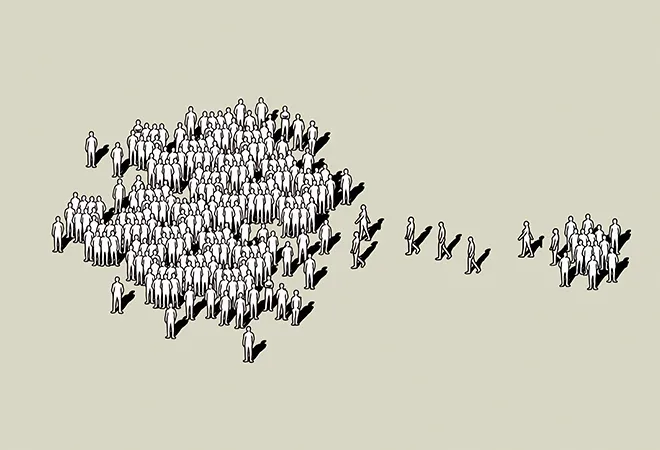
Political defections are one of the most ubiquitous phenomena of democratic politics in India. There have been recent instances of defections in the poll-bound State of West Bengal from the State’s ruling party Trinamool Congress (TMC) to the Bharatiya Janata Party (BJP) which has made steady political inroads in West Bengal, and also defections by JD (U) legislators to BJP in Arunachal Pradesh.
These notable defections have once again brought the issue of political defections to the forefront. Political defections, which denotes a change of political loyalty of a party legislator or group of legislators who switches over to another party in the inter-election years, have formidable bearing on the nature of party system and electoral representation in a democracy.
Setting the context
The anathema of defections has been a prominent feature of Indian political discourse, like in many other democracies, since the commencement of Indian democratic politics. Rampant instances of defections across parties became a modus operandi of Indian politics resulting in incessant dislodging of democratically elected governments by rival parties through orchestrated defection, especially at the state level in India.
The subsequent unfolding of political developments revealed that the anti-defection legislation has largely failed to stall the menace of defections and it continues to take place unabated even today.
The proliferation of such practices resulted in the enactment of the anti-defection law in India in 1985. Thereafter, the subsequent unfolding of political developments revealed that the anti-defection legislation has largely failed to stall the menace of defections and it continues to take place unabated even today. With the rise of Bharatiya Janata Party as the dominant political force in Indian politics since 2014,a plethora of defections from the politically weaker Congress party and other regional parties who joined the BJP at various points of times in the last six years, have continued the trend.
Ethical paradox
The idea of political defections has always involved a paradoxical ethical question in the practice of democratic politics. The act of sudden abandonment of the party to which the defector belonged and switching to another party (often rival parties) after winning the election under the banner of the earlier party, is largely perceived as an act of political impropriety and opportunism.
However, it is difficult and empirically untenable to make a clear distinction between defections that are done solely for immediate political gains and ones that takes places due to ideational or ideological grounds as many a times both the factors can be inextricably enmeshed with each other. However, the very act of defection can not only be a product of unethical politics.
It is difficult and empirically untenable to make a clear distinction between defections that are done solely for immediate political gains and ones that takes places due to ideational or ideological grounds.
Rather, defections might also be perceived as instruments for upholding democratic principles of equality, accommodation and justice. As pointed out by political scientist Gopal Guru, “It is often claimed that the decision to defect is driven by the urgency to defend one’s political autonomy and stand by the principles of democracy and justice.” Thus, in defection, such defectors may choose to find a “noble” cause.
From the defector’s point of view, defection may be treated as a moral protest is aimed at restoring democracy, both within the party in question and in promoting democratic spirit in the polity. Such defectors, in their feat of self-righteousness, may also locate the value of justice in the act of crossing over to other parties. Put differently, such moves of defection are seen as desirable as though they were driven by larger concerns for justice; justice that anticipates the party bosses to treat their leaders with fairness and dignity. This creates an intractable ethical dilemma in electoral democracies with regard to the act of defection.
Anti-defection law
However, as the process of defection has continued to foment political instability despite the anti-defection law, the focus of discussion has largely been on attempts to revamp the anti-defection legislation for making it more effective and stringent. As discussed by political analysist Chakshu Roy, ‘a legalistic approach’ has been taken “to address the problem of defection, but political issues require political solutions.”
Roy further explained that the approach of bringing in the law to resolve the problem of shifting political loyalties of the legislators is replete with challenges. Roy particularly points out that the legal framework focuses solely on imposing punitive measures on the defectors for changing parties, but leaves aside the political parties who should be made responsible for defection as they are the main drivers of engineering defections and destabilising elected governments ruled by their opponents.
Apart from this, the nature of party organisation and the level of inner party democracy also plays a pivotal role in impacting the nature of defections in political parties in India. Scholars Pradeep Chhibber, Francesca Refsum Jensenius and Pavithra Suryanarayan in their important paper, Party Organisation and Party Proliferation in India, argues that parties with stronger organisational discipline where there are clearly established and transparent rules of political mobility, decision-making, election ticket distribution, witnesses lesser instances of political defection.
As the process of defection has continued to foment political instability despite the anti-defection law, the focus of discussion has largely been on attempts to revamp the anti-defection legislation for making it more effective and stringent.
This is because, in such organised and more democratic parties, the members feel more confident of having a sure career advancement within the party if they can diligently serve the party. On the contrary, the parties which have weaker organisation and are largely personality-centric are more susceptible to defections as decision are mostly taken based on the supreme leader’s whims with nepotistic considerations.
As, transparent decision-making and political mobility rules are absent, the members feel insecure about their political career within the party and hence resort to defections to other parties or float new political outfits. Hence, the paper emphasises that the higher degree of inner-party democracy and organisational coherence disincentives the party members from defecting as they feel secured about their political career in a more democratic and organised party structure. On the other hand, parties which are run on the sole arbitrary diktats of the highest leader, factionalism and personality clashes within the lower rungs of leadership might more likely trigger defection for considerations of better political career of the disgruntled leaders.
Towards a cohesive approach
So, it is undeniably true that the process of defection has posed challenges of political instability and electoral volatility in established democracies like India. But, sole emphasis of electoral and anti-defections law is less likely to address the problem.
A deeper analysis of the working of the party structures and leadership style is necessary to unravel the fundamental factors that create the breeding grounds for defection apart from the immediate palpable concerns. Only a coherent approach towards ushering in positive reforms for improving the functioning of parties, can ensure long-term solutions to such inevitable challenges in a democracy.
This article originally appeared in ORF South Asia Weekly.
The views expressed above belong to the author(s). ORF research and analyses now available on Telegram! Click here to access our curated content — blogs, longforms and interviews.




 PREV
PREV


